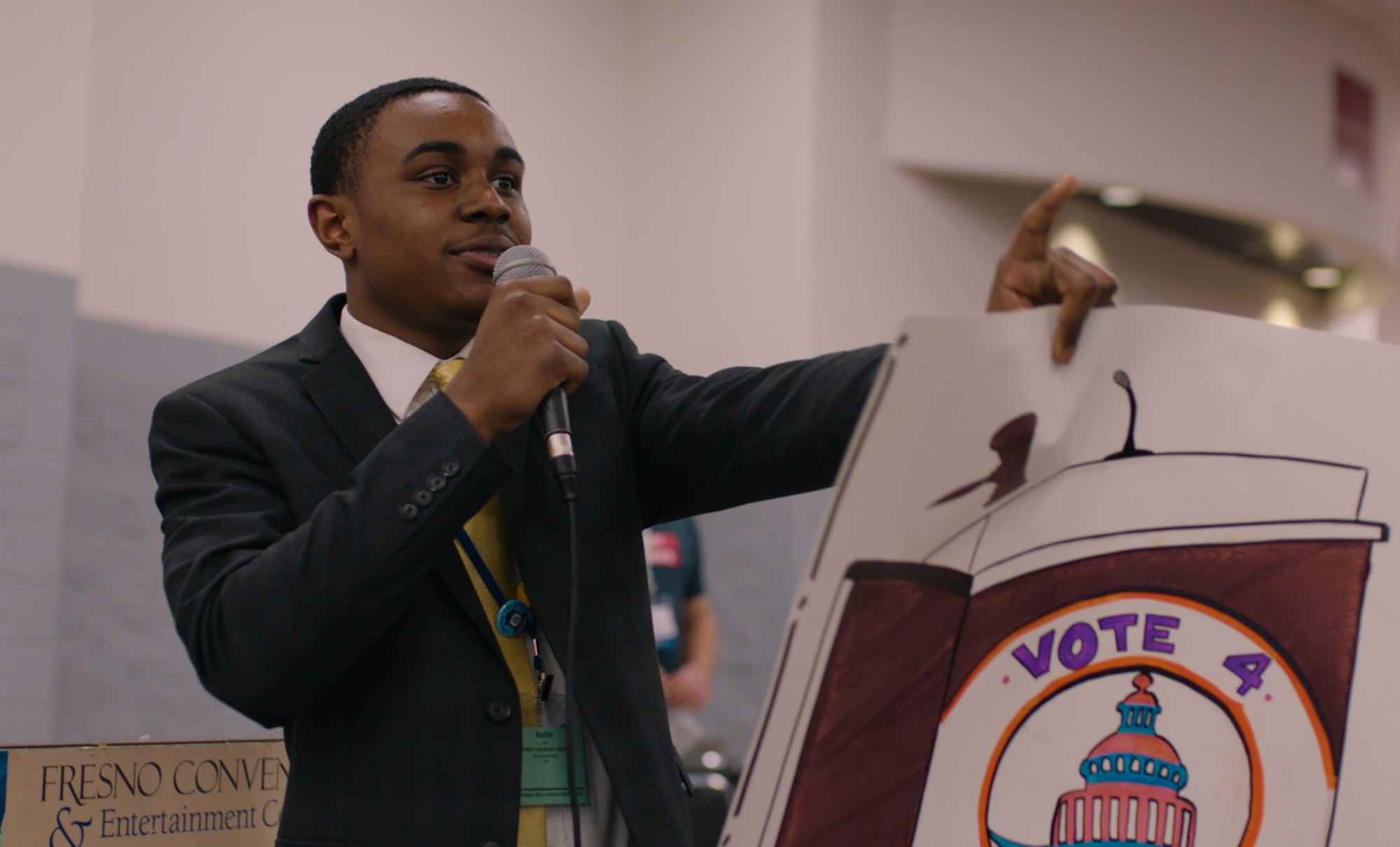
- Film
“The Youth Governor” Documentary Chronicles Civic Education Through Lived Experience
If an innate sense of curiosity, openness toward others different from ourselves, and the capacity for cooperation is evident in children from birth, it’s also true that the notion of democracy — which benefits incredibly from these traits — must be learned. To that end, civic education is essential, providing the foundational bedrock upon which later adult civic engagement relies.
In fact, it could be argued quite easily that myriad fights over school curricula and other classroom issues currently dominating the American sociopolitical scene reflect the cunning selection of an easier battlefield upon which to attempt to bend a populace toward autocracy. A counterbalancing balm to this anxiety-provoking notion arrives in the form of the documentary The Youth Governor, which enjoys a theatrical run in advance of its August 26 arrival on Amazon and Apple TV.
The directorial debut of brothers Jaron and Matthew Halmy, the movie focuses on 4,000 California high school students as they form and run a simulated “state government,” complete with elections, legislators, lobbyists, and political party bosses. In telling this unique story, the pair helps provide a hopeful look at the next generation of foot soldiers in the new long twilight struggle against apathy, cynicism, and disinformation.
The YMCA’s “Youth and Government” is a nationwide civics and leadership program, administered locally and spanning 44 different states. It provides over 55,000 American students in middle school, high school and even college the opportunity to simulate their respective state governments, and thereby learn through doing — actively drafting political party platforms, campaigning for office, drafting bills for legislative approval and the like.
The Youth Governor focuses on the 2019 race for California’s titular officeholder, following six candidates as they experience the tense realities of political gamesmanship, both before and after winning their respective party nominations. Tate Oien attempts to leverage the full power of his passionate rhetorical ability. Solomon Kim uses colorful suits to help make an impression. Easygoing Bayo Collins deals with the late reemergence of a video in which he espoused an unpopular opinion seemingly at odd with his current statements. Alex Goldbeck deals with the emotional turbulence of a nearby shooting and forced fire evacuation of her neighborhood. Aidan Blain weighs abandoning his other passion, track and field, in order to devote more time to Y&G. Piper Samuels, meanwhile, contends with the challenges of a highly factious party. As this group is winnowed down to three finalists and eventually one winner, the subjects (and by extension viewers) learn lessons about the value of coalition-building.
The Halmys have a personal connection to the material, having dedicated a combined 30 years to the Y&G program, first as delegates and statewide officers, and then as adult advisors and volunteers. This sense of reverent, anchored passion comes through in the manner in which they keep the focus on their impressive teenage subjects, who also include current California Youth Governor Scott Nagatoshi. Adult voices are rightfully relegated to the back burner, though California Governor Gavin Newsom does make an appearance, telling the assembled teenagers during a speech, “The world is desperate for you to discover your own talents, not mimic adults.” If the manner in which at least a couple of kids co-opt and copy the performative speaking rhythms of adult politicians forces a smile, what is this process of political awakening and self-discovery if not reflective of teenhood more broadly?
Executive produced by Jason Blum, The Youth Governor shares considerable thematic overlap with 2020’s Boys State, which also delved into the messy, chaotic nature of representative governance being absorbed by teenagers. But whereas that movie served up its nonfiction portrait by way of a somewhat rowdy Texas summer camp, The Youth Governor sidesteps a lot of testosterone-fueled acting out simply by virtue of its gender diversity. Its subjects seem more focused on the actual tenets of democratic engagement and a bit less on pulled levers of power, even if they acknowledge and understand the tangible benefits of some spin or artifice.
In fact, one of the movie’s most surprising and emotionally fortifying narrative strands involves an articulate, hyper-conservative behind-the-scenes power-player concocting an undercover sting exercise, “Operation Golden Bear,” to root out anti-Semitism against a candidate with whom he disagrees on most issues. (Contrast this with a Boys State character so comfortable in his suit of insincere villainy that he seems to be auditioning for the role of a “mini-me” Karl Rove or Roger Stone.)
Moments like the above-mentioned one help give The Youth Governor a nice sheen of optimism for the future. So, too, does the maturity evinced when the election winner says that maybe adults, in witnessing all the workings of the Y&G program, can reflect on being part of something bigger than themselves.
Perhaps, after all, the kids are all right.

